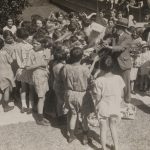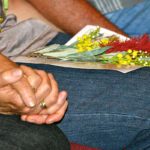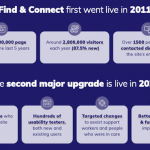RAD2 Workshops
- May 8, 2017
- In Events
Earlier this year, 16 organisations were funded to make records more accessible to Care Leavers through the RAD2 (Records Access Documentation) Grants Program. In February, the RAD2 team travelled around Australia delivering workshops on the organisation, documentation and supported access to records relating to Care Leavers.
The workshops gave those organisations the opportunity to re-consider what records could be important to Care Leavers, and to think beyond the records associated with a person’s name to those things that may provide context to the person’s time in “care”. Workshop content was tweeted for those who could not attend in person.

Workshop participants found that regular events such as Christmas parties, important visits and even regular food deliveries and menus could help to build a picture of childrens’ life in “care”.
After considering the types of records that could be relevant and important to Care Leavers, organisations were shown how to document those records to make them quickly and easily accessible.

One aspect of the Grant was to ensure that the time between a Care Leaver’s request for records and those records being provided to them is reduced through the better documentation of records. The decision to access records can be a difficult one, and the time taken between a request and documents being made available can be very difficult. It is also important for organisations to be aware of the records they hold, so they can provide information about records that are damaged or missing. Documenting records was therefore an important part of the workshops.

Many organisations are including digitisation in their projects, as part of a wider documentation project. Standards for digital archives are just as important as for physical records – formats, security and maintaining high-resolution originals all factor in the creation of a digital archive. Where original records are fragile, digitisation becomes even more important.
There is no national, implemented standard for supported access, and we found that different organisations provide access to records in different ways. Many encouraged a support person, some-one either known to the Care Leaver personally or provided by the organisation, to be present when records are first accessed. All had differing approaches to redacting records, weighing individual Care Leavers’ need to access information with what they considered wider privacy issues for all who were in “care” at the time.

The workshops were well-received and it was a great opportunity to meet with the organisations striving to improve Care Leavers access to the records they hold. We look forward to the completion of these projects and the positive impacts they should have for Care Leavers trying to better understand their time in “care”.





